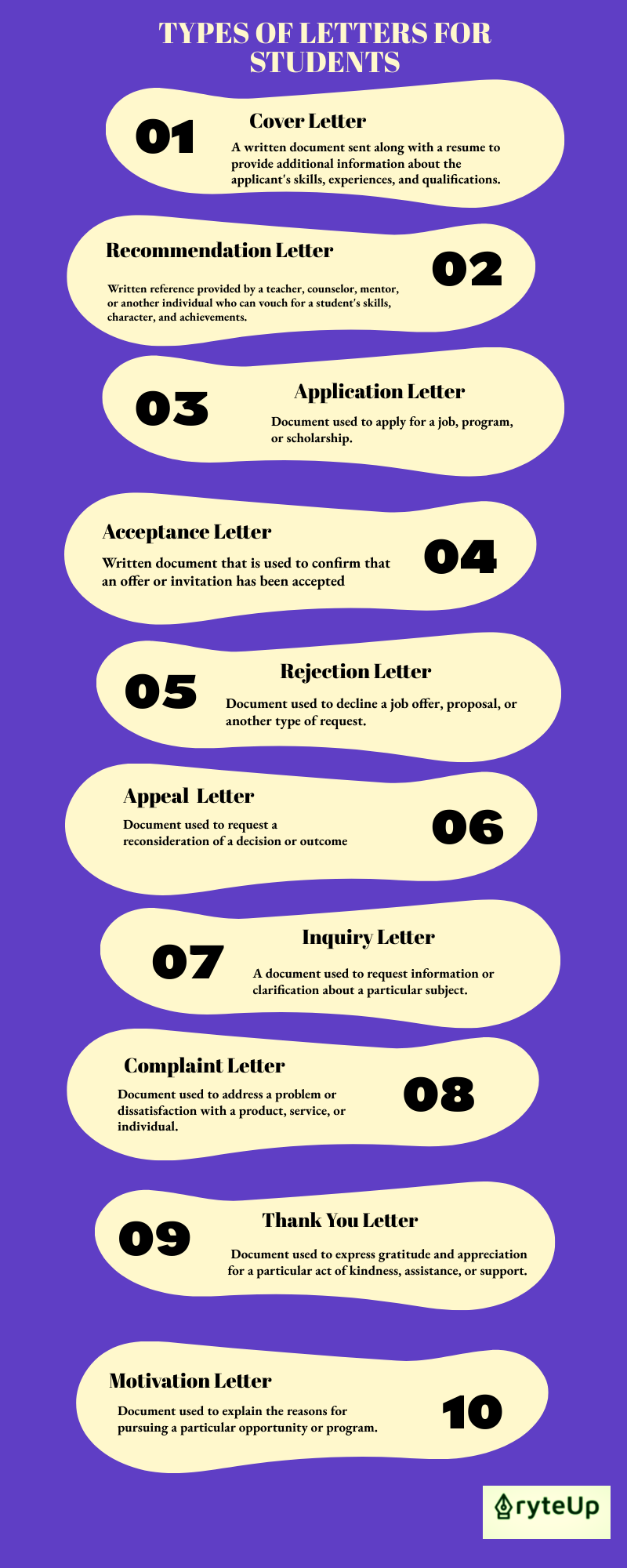Letter: Definition, types, and uses

Letters are written forms of communication used to convey information, express thoughts or feelings, and make requests. They can be either handwritten or typed and can take various forms, such as personal letters, business letters, or official letters.
Letters can be sent through traditional mail or electronic means, such as email, and are addressed to a specific recipient. They may also include a date, salutation, body, closing, and signature.
Letters serve many purposes, including conveying information, expressing emotions, making requests, building relationships, and documenting events. They are a flexible and versatile form of communication that can be adapted to meet a wide range of needs.
Uses and purpose of letters
Letters have a variety of uses and purposes, including:
- Conveying Information: Letters are commonly used to provide information about a particular subject or issue, such as a job offer, a business proposal, or an update on a project.
- Expressing Thoughts and Feelings: Letters can also be used to express personal thoughts, feelings, or opinions. For example, a letter of recommendation can provide insight into a student’s character, while a love letter can express affection.
- Making Requests: Letters can be used to make requests, such as asking for a job interview, making a reservation, or requesting information.
- Building Relationships: Letters can help to build and maintain personal or professional relationships by expressing gratitude, offering congratulations, or seeking advice.
- Documenting Events: Letters can be used as a form of documentation, such as a letter of resignation that serves as an official record of an employee’s departure.
- Solving Problems: Letters can also be used to resolve problems or complaints, such as a complaint letter that addresses an issue with a product or service.
- Applying for Opportunities: Letters can be used to apply for a job, scholarship, or other types of opportunity, such as an application letter or a motivation letter.
In summary, letters serve as a flexible and versatile form of communication that can be adapted to meet a wide range of needs and purposes.
Types of Letters for Students

There are several types of letters that students may need to write, including:
- Cover Letter: A cover letter is a written document sent along with a resume to provide additional information about the applicant’s skills, experiences, and qualifications. The purpose of a cover letter is to introduce oneself to a potential employer, highlight relevant qualifications, and explain why the applicant is a good fit for the position.
- Recommendation Letter: A recommendation letter is a written reference provided by a teacher, counselor, mentor, or another individual who can vouch for a student’s skills, character, and achievements. The purpose of a recommendation letter is to provide a potential employer, college, or scholarship committee with a more comprehensive view of the student’s strengths and capabilities.
- Application Letter: An application letter is a written document used to apply for a job, program, or scholarship. The purpose of an application letter is to provide a detailed and compelling account of the applicant’s qualifications, achievements, and goals, and to persuade the reader to consider the applicant for the position or opportunity.
- Acceptance Letter: An acceptance letter is a written document that is used to confirm that an offer or invitation has been accepted. The purpose of an acceptance letter is to formally acknowledge and accept a job offer, college admission, or another type of invitation.
- Rejection Letter: A rejection letter is a written document used to decline a job offer, proposal, or another type of request. The purpose of a rejection letter is to politely inform the recipient that the offer or proposal will not be accepted and to provide an explanation for the decision, if necessary.
- Appeal Letter: An appeal letter is a written document used to request a reconsideration of a decision or outcome. The purpose of an appeal letter is to present additional evidence or arguments to support a change in the original decision, such as appealing a denied college admission or a grade dispute.
- Inquiry Letter: An inquiry letter is a written document used to request information or clarification about a particular subject. The purpose of an inquiry letter is to gather information about a particular topic, such as inquiring about a job opening or program requirements.
- Complaint Letter: A complaint letter is a written document used to address a problem or dissatisfaction with a product, service, or individual. The purpose of a complaint letter is to bring attention to the issue, request a resolution, and provide a record of the complaint.
- Thank You Letter: A thank you letter is a written document used to express gratitude and appreciation for a particular act of kindness, assistance, or support. The purpose of a thank you letter is to show appreciation, maintain relationships, and build goodwill.
- Motivation Letter: A motivation letter is a written document used to explain the reasons for pursuing a particular opportunity or program. The purpose of a motivation letter is to provide a personal account of why the applicant is motivated to pursue the opportunity and what unique qualities and experiences the applicant brings to the table.
Formal letter vs. Informal letter
Formal letters and informal letters are two different styles of written communication that are used for different purposes and have different characteristics.
Formal letters
Formal letters are typically used in business or professional settings and have a formal tone and structure. They are usually addressed to people with whom the writer has a formal relationship, such as a supervisor, a client, or an official. Formal letters follow a specific format, including a formal salutation, a clear and concise body, and a professional closing. They also typically use formal language and avoid the use of contractions, slang, and emoticons.
Informal letters
Informal letters, also known as personal letters, are written to friends, family, or other individuals with whom the writer has a personal relationship. They have a more relaxed tone and structure and typically use casual, friendly language. Informal letters may include personal anecdotes, emotions, and opinions and may not follow a specific format.
In general, formal letters are used in situations that require a professional or formal approach, while informal letters are utilized in more personal or relaxed settings. It is essential to choose the appropriate style of the letter depending on the purpose and recipient of the communication.